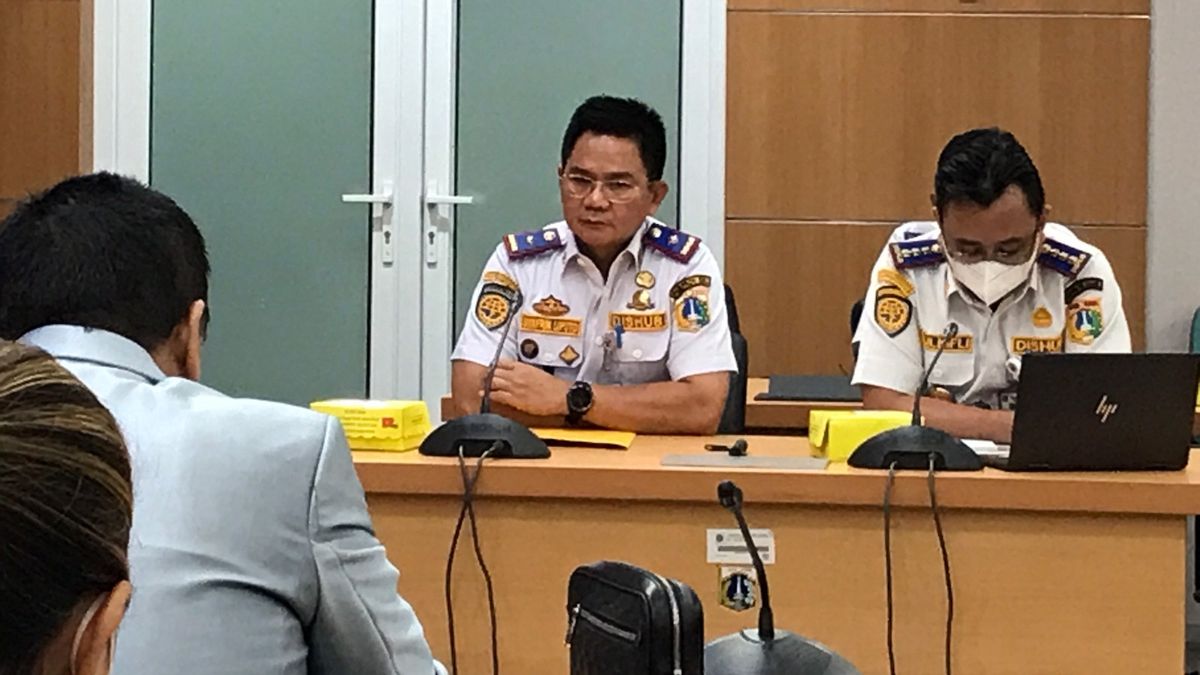JAKARTA - Head of the DKI Jakarta Transportation Agency, Syafrin Liputo, emphasized that motorcycles will also be subject to paid road rates or electronic road pricing (ERP) such as other private motorized vehicles.
This is different from the application of traffic control which has previously been implemented, namely odd-even and three in one, where motorcycles are excluded from the regulation.
"In our proposal two-wheeled vehicles (including vehicles subject to tariffs) except bicycles," said Syafrin when met at the DKI Jakarta DPRD Building, Monday, January 16.
Then, is online motorcycle taxi vehicles also charged with the ERP tariff? Implicably, Syafrin admitted that motorcycle ojol was also charged with tariffs, because the vehicle was not included in the yellow plate vehicle (public transportation).
"For the regulations, in accordance with the law, the exception is of course yellow-plate public transportation," said Syafrin.
In the results of the DKI Transportation Agency's study, there are factors that are considered by motorcycles as well as the charge of ERP rates. Referring to data from the DKI Central Statistics Agency (BPS) in 2020, the number of motorcycles in one year increased by about 5.3 percent.
Then, the odd-even implementation which is currently an effort to control traffic has resulted in 37 percent of car users turning to motorbikes, 17 percent switching to online motorcycle taxis and transportation, and only 27 percent switching to public transportation.
For information, a draft Regional Regulation (Raperda) on Electronic Traffic Control that regulates paid roads has been prepared. The Provincial Government and the DKI DPRD have also conducted initial discussions regarding the contents in the draft, but the discussion of articles per article has not been carried out.
Seen in the draft Raperda, there are 25 roads that will be subject to the implementation of ERP, namely Jalan Pintu Besar Selatan, Jalan Gajah Mada, Jalan Hayam Wuruk, Jalan Majapahit, Jalan Medan Merdeka Barat, Jalan MH Thamrin; Jalan Jenderal Sudirman, Jalan Sisingamangaraja, Jalan Panglima Polim, Jalan Fatmawati (Simpang Jalan Ketimun 1-Simpang Jalan TB Simatupang).
Then, Jalan Suryopranoto, Jalan Balikpapan, Jalan Kyai Caringin, Jalan Tomang Raya, Jalan Jenderal S Parman (Jalan Tomang Raya-Simpang Jalan Gatot Subroto), Jalan Gatot Subroto, Jalan MT Haryono, Jalan DI Panjaitan, Jalan Jenderal A Yani (East Bekasi Raya Intersection-Perintis Kemerdekaan Intersection), Jalan Pramuka, Jalan Salemba Raya, Jalan Kramat Raya, Jalan Pasar Senen, Jalan Gunung Sahari; and, Jalan HR Rasuna Said.
Then, electronic traffic control in traffic control areas applies electronically every day from 05.00 WIB-22.00 WIB.
The vehicles charged with ERP rates are road users who use motorized vehicles and electric vehicles. There are a number of vehicles that are excluded in the application of paid road systems, including electric bicycles, yellow plate public motorized vehicles, government agency and TNI/Polri operational service vehicles except/in addition to black plates, foreign diplomatic corps vehicles, ambulance vehicles, corpse vehicles, and fire fighting vehicles.
The amount of tariff for traffic control services electronically and its adjustment is determined by the Governor's Regulation after obtaining approval from the DKI Jakarta DPRD. Meanwhile, the DKI Transportation Agency proposes that ERP be subject to a tariff of IDR 5,000 to IDR 19,000.
The English, Chinese, Japanese, Arabic, and French versions are automatically generated by the AI. So there may still be inaccuracies in translating, please always see Indonesian as our main language. (system supported by DigitalSiber.id)








